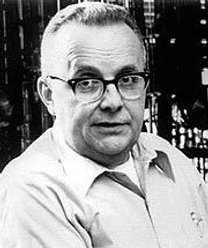
Oral history interview with John H. Sinfelt
- 1995-Feb-21
Oral history interview with John H. Sinfelt
- 1995-Feb-21
In this interview, Dr. Sinfelt recalls his childhood during the Depression, his early education, and his interest in mathematics. He then moves on to the awakening of his interest in science, first at Lycoming College and then at Pennsylvania State University. He decided to continue on to graduate work at the University of Illinois. Sinfelt describes the University's chemistry department under Roger Adams and his own studies under Harry Drickamer.
Moving on to the Exxon Research and Engineering Company, Sinfelt recounts how post-World War II demand for increased production of high octane gasoline led to two developments: the choice of fixed-bed platinum hydroforming over fluid-bed hydroforming and the choice of precious rather than non-precious metal catalysts. Sinfelt describes how his research on catalytic reaction kinetics meshed with Exxon's increased emphasis on basic research and how this led to his discovery of bimetallic clusters and the success of the platinum-iridium catalyst. He describes how Exxon's commercial use of this catalyst, along with Chevron's platinum-rhenium catalyst led to the development of lead-free gasoline and decreased carbon monoxide emissions. Sinfelt next discusses current environmental concerns about this system. He then explains his research on the crystalline structure of bimetallic catalysts, which led to the characterization of small metallic particles and metallic adsorption. Finally, Sinfelt discusses Exxon's attitude toward research; his book Bimetallic Catalysts, in which he theorizes on the relationship between an element's catalytic activity and its place in the periodic table; and his views on innovation, teamwork, and the future of research in the chemical industry.
| Property | Value |
|---|---|
| Interviewee | |
| Interviewer | |
| Place of interview | |
| Format | |
| Genre | |
| Extent |
|
| Language | |
| Subject | |
| Rights | Creative Commons Attribution-NonCommercial-NoDerivatives 4.0 International License |
| Rights holder |
|
| Credit line |
|
About the Interviewer
James J. Bohning was professor emeritus of chemistry at Wilkes University, where he had been a faculty member from 1959 to 1990. He served there as chemistry department chair from 1970 to 1986 and environmental science department chair from 1987 to 1990. Bohning was chair of the American Chemical Society’s Division of the History of Chemistry in 1986; he received the division’s Outstanding Paper Award in 1989 and presented more than forty papers at national meetings of the society. Bohning was on the advisory committee of the society’s National Historic Chemical Landmarks Program from its inception in 1992 through 2001 and is currently a consultant to the committee. He developed the oral history program of the Chemical Heritage Foundation, and he was CHF’s director of oral history from 1990 to 1995. From 1995 to 1998, Bohning was a science writer for the News Service group of the American Chemical Society. In May 2005, he received the Joseph Priestley Service Award from the Susquehanna Valley Section of the American Chemical Society. Bohning passed away in September 2011.
Institutional location
| Department | |
|---|---|
| Collection | |
| Oral history number | 0134 |
Related Items
Interviewee biographical information
| Born |
|
|---|---|
| Died |
|
Education
| Year | Institution | Degree | Discipline |
|---|---|---|---|
| 1951 | Pennsylvania State University | BS | Chemical Engineering |
| 1953 | University of Illinois at Urbana-Champaign | MS | Chemical Engineering |
| 1954 | University of Illinois at Urbana-Champaign | PhD | Chemical Engineering |
Professional Experience
Exxon Research and Engineering Company
- 1954 to 1957 Research Engineer
- 1957 to 1962 Group Leader
- 1962 to 1968 Research Associate
- 1968 to 1972 Senior Research Associate
- 1972 to 1979 Scientific Advisor
- 1979 to 1996 Senior Scientific Advisor
- 1996 to 1997 Senior Scientific Advisor Emeritus
Honors
| Year(s) | Award |
|---|---|
| 1971 | Alpha Chi Sigma Award in Chemical Engineering Research, American Institute of Chemical Engineers |
| 1973 | Paul H. Emmett Award in Fundamental Catalysis, Catalysis Society |
| 1975 | Elected to National Academy of Engineering |
| 1975 | Professional Progress Award for Outstanding Progress in Chemical Engineering, American Institute of Chemical Engineers |
| 1976 | American Chemical Society Award in Petroleum Chemistry |
| 1977 | Dickson Prize in Science and Engineering, Carnegie-Mellon University |
| 1978 | American Physical Society International Prize for New Materials |
| 1979 | Elected to National Academy of Sciences |
| 1979 | President's National Medal of Science |
| 1980 | Elected a Fellow of the American Academy of Arts and Sciences |
| 1981 | Honorary DSc, University of Illinois |
| 1981 | Chemical Pioneer Award, American Institute of Chemists |
| 1984 | Perkin Medal in Chemistry, Society of Chemical Industry (American Section) |
| 1984 | Gold Medal in Chemistry, American Institute of Chemists |
| 1985 | Distinguished Alumnus Award, Pennsylvania State University |
| 1986 | E. V. Murphree Award in Industrial and Engineering Chemistry, American Chemical Society |
| 1991 | Elected to New Jersey Inventors Hall of Fame |
| 1994 | Elected to American Philosophical Society |
Cite as
See our FAQ page to learn how to cite an oral history.
Complete transcript of interview
sinfelt_jh_0134_FULL.pdf
The published version of the transcript may diverge from the interview audio due to edits to the transcript made by staff of the Center for Oral History, often at the request of the interviewee, during the transcript review process.









